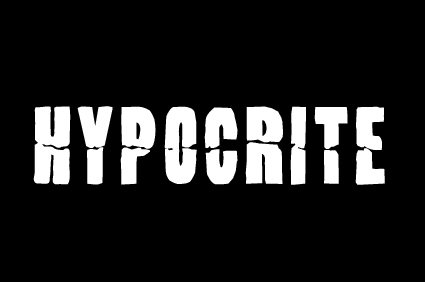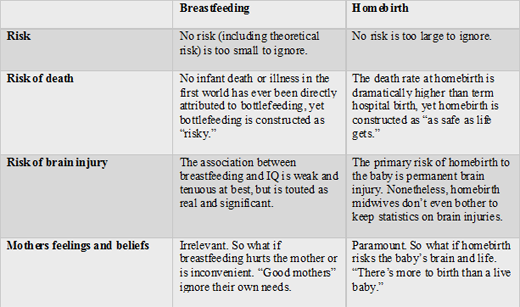Homebirth advocates are hypocrites. They tout two diametrically opposed views of risk in an effort to justify their personal preferences.
Homebirth advocates are invariably lactivists. Lactivism is based on the belief, central to attachment parenting, that mothering is about doing whatever it takes to reduce risks to babies to the lowest possible level and doing whatever it takes to promote brain development (real or imagined). Homebirth is about ignoring risks to babies, either by pretending those risks do not exist, or by insisting that there is more to birth than whether a baby is healthy.
Consider:
There is not a single infant death in the first world that has ever been attributed to infant formula properly prepared (by both factory and parent), yet homebirth advocates insist that formula is “risky,” should be locked up in hospitals, and, if lactivists had their way, should be available by prescription only. There are dozens of preventable homebirth deaths each year, yet homebirth is constructed as “safe as houses” or “as safe as life gets.”
We live in a society obsessed with “intelligence.” According to homebirth advocates, mothers should breastfeed in order to obtain every last IQ point possible. What about the risk of brain damage at homebirth? It’s never even mentioned. Homebirth midwives don’t bother to keep any statistics on brain injuries that occur at homebirth.
Indeed the entire approach to risk is inverted 180 degrees when comparing breastfeeding and homebirth. In regard to breastfeeding there is literally no “risk” of bottlefeeding too small to be taken into account. Yet when it comes to homebirth, there appears to be no risk too large to be ignored. Breech? VBAC? Twins? Triplets? More risk leads to more kudos.
When it comes to breastfeeding, homebirth advocates consider mothers’ feelings to be irrelevant. There is simply no amount of maternal pain, difficulty or inconvenience that can justify bottle feeding in their minds. Yet the same people see no problem with a mother risking her baby’s death at homebirth because she’s afraid of the hospital, or doesn’t want the discomfort of a heplock.
If it could be shown that a baby died specifically because of bottlefeeding, homebirth advocates would be up in arms. When a baby dies at homebirth, advocates tell each other that the baby was “meant” to die. Formula manufacturers are evil; homebirth midwives who preside over preventable perinatal deaths, even multiple perinatal deaths, are “persecuted.”
There is one area that homebirth advocacy and lactivism share in common, though. Both are the personal preferences of privileged white women who have elevated their preferences to an ideal that should be emulated by everyone else.
That’s not surprising. Homebirth and lactivism aren’t about babies; they’re both about mothers and their own self image. Babies are just props in the display of their own imagined superiority.



